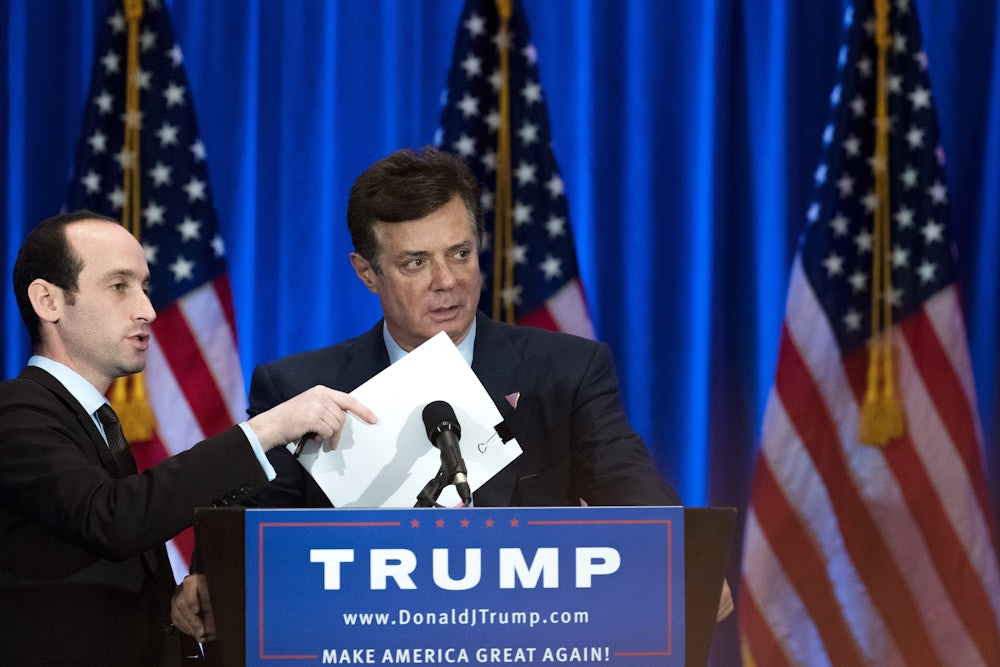For more than a year, President Donald Trump has railed against the Russia investigation as a partisan “witch hunt” organized by his political enemies to bring down his administration. Twelve jurors in Alexandria, Virginia, sent a message of their own on Tuesday by finding Paul Manafort guilty on eight counts: Here be witches.
Trump’s former campaign chairman was found guilty on five counts of tax fraud, two counts of bank fraud, and one count of failing to register a foreign account. Judge T.S. Ellis III announced a mistrial on 10 other counts.
Tuesday’s conviction marks a significant milestone in special counsel Robert Mueller’s investigation. His office has secured several guilty pleas so far, pacing it ahead of other major investigations like Watergate and Whitewater. But Tuesday’s verdict marks the first time that a trial jury—twelve American citizens—sat in judgment of Mueller’s prosecution. Though they failed to reach a consensus on ten charges, for which Mueller can seek a new trial, securing convictions on eight charges marks a significant victory for his team.
Manafort’s trial didn’t directly touch upon Russian election interference, and the acts for which he was convicted all took place before his tenure as Trump’s campaign chairman in 2016. Nonetheless, the verdict is a blow to Trump. The president has worked tirelessly to discredit the Russia investigation and everyone involved in it. He fired FBI Director James Comey last year, reportedly tried to fire Mueller himself twice, has urged Attorney General Jeff Sessions to un-recuse himself and shut down the inquiry, and has effectively purged the FBI of its senior leadership from when the probe began. By finding Manafort guilty on some counts but not others, the jury effectively refuted Trump’s claims that the system is rigged against him and his allies.
What’s more, an eerily simultaneous series of events in New York City on Tuesday compounded the political damage for the president. Michael Cohen, the president’s former personal attorney, struck a plea agreement with federal prosecutors and pleaded guilty to eight counts of fraud-related charges—including the violation of campaign-finance laws by organizing a hush-money payment for Stephanie Clifford, the adult film actress known as Stormy Daniels, during the election. That plea effectively places the president within arm’s reach of criminal activity during his own election.
For Manafort himself, the conviction caps a spectacular fall from political grace for the 69-year-old political operative, who led the Republican presidential nominee’s campaign only two summers ago. Before joining Trump’s team, Manafort cut his teeth in Washington, D.C., as a political lobbyist before turning his attention to consulting for political campaigns overseas. Trump turned to him in the spring of 2016 as the Republican National Convention neared.
At the heart of the government’s case were Manafort’s finances and how he acquired them. The vast sum of his wealth flowed from his work as a consultant for pro-Moscow political parties in Ukraine. Prosecutors said Manafort earned more than $60 million for his labors in the eastern European country, which he then channeled through foreign bank accounts to evade taxes and other regulatory scrutiny. “Mr. Manafort lied when he had money and lied to get more money when he didn’t,” Greg Andres, the lead prosecutor in the Manafort trial, told the jury in his closing arguments. “This is a case about lies.”
By hiding the scope of his wealth from the government, prosecutors said, Manafort was able to furnish a lavish lifestyle for himself and his family. Jurors received details on all manner of luxurious purchases: a $2 million home in northern Virginia, one of the nation’s wealthiest regions, as well as clothes and accessories that ranged from the indulgent (a $21,000 watch) to the eccentric (a $15,000 ostrich jacket). Manafort seemed to have a fondness for expensive rugs in particular: Prosecutors said he spent more than $930,000 at an antique rug store in Alexandria.
The special counsel’s office spent the bulk of the trial walking jurors through the tangled financial world in which Manafort dwelt. Cindy Laporta, a former accountant, testified how she helped Manafort evade millions of dollars in tax penalties by classifying some of his income as loans. Heather Washkuhn, his former bookkeeper, told the court how Manafort’s lifestyle proved unsustainable by 2015 as his consulting firm’s revenue began to dry up. To make ends meet, she testified, he and his deputy Rick Gates began to misrepresent the firm’s finances to secure loans.
Gates’s involvement in Manafort’s finances played a central role in arguments made by both the prosecution and the defense. As Manafort’s longtime right-hand man, he was well placed to witness every aspect of his patron’s fiscal legerdemain. Gates, who pleaded guilty to conspiracy and making false statements earlier this year, spent two days testifying before the court that he and Manafort had “committed crimes” together.
Manafort’s defense attorneys, led by veteran tax litigator Kevin Downing, painted Gates as a self-serving underling who may have actually been responsible for the crimes alleged by prosecutors. They also flensed his personal life to discredit him and his testimony. On the witness stand, Gates admitted to stealing from Manafort himself during their decade-long business relationship. The defense also pressed him to admit to multiple extramarital affairs to damage his credibility even further. Gates, for his part, adopted a mien of repentance and regret.
Tuesday’s verdict is not the end of Manafort’s legal troubles. Mueller may retry him on the 10 charges in which the jury failed to reach a verdict. In September, Manafort is also scheduled to go on trial in D.C. federal court for alleged crimes committed in that jurisdiction. Mueller’s office originally charged Manafort with money laundering and failing to register as a foreign agent, both related to his consulting work in Ukraine. In June, prosecutors also added charges of witness tampering, after accusing Manafort of trying to “suborn perjury” by contacting former colleagues who may be called to testify against him.
